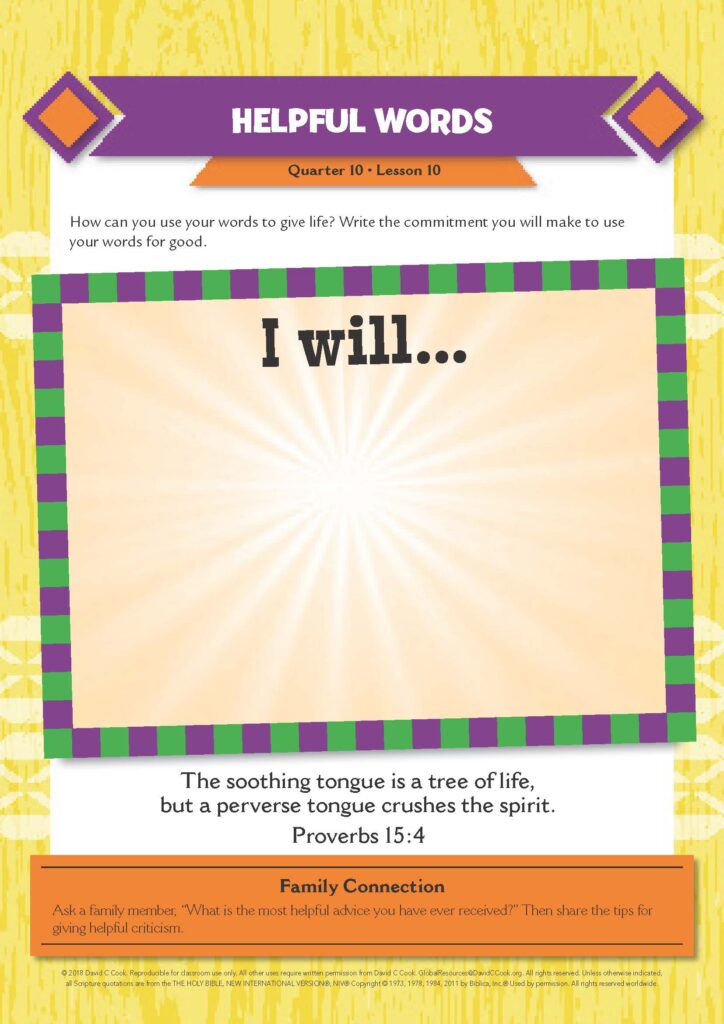During the lesson, the information for you to know is written in regular type, and what we suggest speaking or reading aloud to children is in bold. All resources for this lesson, including the Teacher Guide, Student Page, Family Connection Card, and other resources can be downloaded in a ZIP file by clicking on the following link:
In some lessons you will find "resource articles." These are articles written by experts from around the world to help equip you for your work with children and adolescents. Share them with parents or guardians if you consider it appropriate.
Perfume and incense bring joy to the heart, and the pleasantness of a friend springs from their heartfelt advice.
Proverbs 27:9
Helpful criticism is hard to give, and it can be even harder to receive. But it is important for us to learn to give and receive correction. The Bible is filled with examples of believers guiding others to live in more godly ways. We are instructed to become more like Jesus each day, and sometimes it is the advice and criticism of others that helps us to grow.
How do you respond when someone gives you advice or criticism? Do you listen well and consider the other person’s words? Or do you become defensive and angry? Being willing to listen, learn, and change can help us to become more like Jesus. So pray each day for a teachable spirit. You may be surprised at what you learn from the heartfelt advice of others! And you may be pleased by the pleasantness it brings to your life.
Encourage the students to ask their family members, “What is the most helpful advice you have ever received?” They can then share the tips for giving helpful criticism.
Teacher Tip: If possible, email or text the Family Connection Card to the families of your students.
Greet the teens by name as they arrive. Ask them to share ways they used words positively in the past week. Allow 2–3 students to share their stories with the rest of the class. When you are ready to begin class, have the teens sit down in a circle for the activity. Sit in the circle with them, if possible.
Many cultures use a talking stick when they have group discussions. Only the person holding the talking stick can speak. Everyone else is expected to listen respectfully. This helps the tribes to show honour to those who are speaking and to ensure that every person’s thoughts are heard. Using the talking stick helps these tribes to solve problems and resolve conflict in a peaceful way.
Hold up the tree branch.
Today, this will be our talking stick. Only the person holding the talking stick may speak. All others need to listen politely and respectfully. I will ask a question, and you will each have an opportunity to answer. But you must wait until you receive the talking stick. When you receive it, you can share a brief answer and then pass the stick to the person on your right.
Here is the question:
What is the most helpful thing anyone has ever said to you?
Share your own brief answer. Then pass the stick to the student on your right. Continue until all of the students have had an opportunity to share their thoughts.
When the stick is handed back to you by the last student, share the following:
As we have learned, words are very powerful and important. The words we choose to use affect others, and they also affect the opinions others form about us. In this activity, we shared words that have helped us. It is important for us to learn to receive helpful words and to use our words to help others.
One important way we use words to help is by sharing helpful criticism. When we choose our words well and our motivations are right, we can help others to learn and grow. And when we are willing to listen to and learn from the correction of others, we can improve, too. Let’s talk more about how to give and receive helpful criticism.
Put the talking stick aside. You will need it for the Responding activity. Tell the students they do not need to have the talking stick to talk during the next part of the lesson. They can remain in the circle or return to their regular places.
The Bible tells us that giving and receiving wise counsel is important. When we care about someone, we tell him the truth. We also let him tell us the truth, even when it is hard to hear. One way we can grow and learn is by giving and receiving honest, helpful criticism.
Helpful criticism is feedback or advice given for the purpose of helping another person. Helpful criticism helps another person to improve in a particular area or find a solution to a problem.
Feedback shared in a hurtful manner is not helpful criticism. Judgment and prejudice are not helpful criticism either. Helpful criticism is given with the intention of helping a person, not hurting him. Sometimes it hurts to receive helpful criticism. But when we have time to think and pray about what the other person said, we may realize that she was correct and work to improve in that area as a result.
Listen to what the Bible tells us about helpful criticism or “counsel.”
Have a student read Proverbs 27:9 aloud from the Bible. If that is not possible, the verse is printed here for you.
Perfume and incense bring joy to the heart, and the pleasantness of a friend springs from their heartfelt advice.
Proverbs 27:9
According to this verse, what makes the advice of a friend pleasant?
It is heartfelt.
“Heartfelt” means honest, sincere, serious, and important. Heartfelt advice is necessary and helpful, and it is given with the intention of helping the other person to learn and grow. That means helpful criticism should always be given about issues that are important and shared in a caring way. When you give helpful criticism, make sure that the advice you are giving will truly help the person. That means you need to carefully consider and even pray about the helpful criticism before you give it.
What else does this verse teach us about helpful criticism?
Good friends give helpful criticism when necessary.
It can be very hard to give helpful criticism. You may worry that you will hurt the other person or make her angry. You may worry that it will damage the relationship. But the Bible teaches us that we need to give helpful criticism to those we care about to help them to grow and learn.
Wounds from a friend can be trusted, but an enemy multiplies kisses.
Proverbs 27:6
What do you think this verse means?
Good friends tell the truth and try to help their friends, even when it is hard. Enemies only praise and do not try to help a person to improve.
What does this teach us about helpful criticism?
We should give helpful criticism to those we care about.
One of the most important parts about giving and receiving helpful criticism is the spirit in which the advice is given. Criticism intended to hurt a person is not helpful. Listen to what the Bible says about using our words gently.
If you are using the Memory Verse Poster, show it to the students.
The soothing tongue is a tree of life, but a perverse tongue crushes the spirit.
Proverbs 15:4

When we criticize others to hurt them or to make ourselves look or feel better, we can harm our relationships and the people we are criticizing. We can break their spirits. But when we use our words to help and show our care and concern, our words are like a tree of life. They help others to learn and grow.
How do you think we can use helpful criticism in life-giving ways?
How can helpful criticism given in the wrong way or with the wrong intention break a person’s spirit?
Now that we know when to give helpful criticism, let’s talk about how to give it.
First, use kind and positive words. Be encouraging. Before pointing out what someone is doing wrong, compliment him on what he is doing right. This will help the person understand that you are trying to help rather than hurt him.
Have the students find partners. Then share the following situation. Give the students 2–3 minutes to practice giving helpful criticism in that situation. Use this process for each of the situations in this lesson.
Which of these ideas for giving helpful criticism was most helpful? Why?
What other ideas do you have that might help you to give helpful criticism well?
While it is important to give helpful criticism well, it is also important to receive it well. Listen to what the Bible teaches about receiving advice and instruction.
Listen to advice and accept discipline, and at the end you will be counted among the wise.
Proverbs 19:20
How does this verse relate to receiving helpful criticism?
Listening to advice and accepting discipline can help you to be wise.
How should you respond when someone offers you helpful criticism?
Give the students time to discuss their ideas with their partners. Then allow 5–6 students to share their thoughts. If the following ideas are not mentioned, suggest them:
It is important for us to learn to give and receive helpful criticism. When we are willing to learn and grow and when we care enough about those around us to help them to do the same, we can improve our relationships.
Have the students sit in a circle. Then hold up the tree branch again.
Earlier we read a verse that can guide us when we give helpful criticism. Let’s read it again.
The soothing tongue is a tree of life, but a perverse tongue crushes the spirit.
Proverbs 15:4
We should use our words to give life, not to crush a person’s spirit. We should use our words to help and not to hurt. We should make our words a tree of life for those around us. Each of us has an opportunity right now to make a commitment to use our words for good.
I will make a specific commitment to use my words for good. Then I will pass the branch to the person to my right. When that person receives the branch, he will share his commitment. We will continue until everyone has had a chance to make a commitment. If you are not sure what commitment to make or you are not sure you are ready to make this commitment, you can pass the branch without saying anything.
Make a statement that starts with the words “I will,” such as “I will use my words to encourage others” or “I will not say unkind things.” Then pass the branch to the student on your right. Continue until everyone who would like to has had a chance to share.
Optional: If you are using the Student Pages, the teens can write their commitments on their pages.

Close with this blessing. If possible, stand and go around the circle, praying the blessing individually over each student. Use each student’s name in the blessing.
Blessing: (Student’s name), may your words be a tree of life for those around you. May you use the power of your words to bring honour to yourself and glory to God—today, tomorrow, and every day of your life!
Lead the teens in singing this quarter’s song, if possible.
Life on Life ©2020 David C Cook. Reproducible for home or classroom use only. All other uses require written permission from David C Cook [email protected]. All rights reserved.